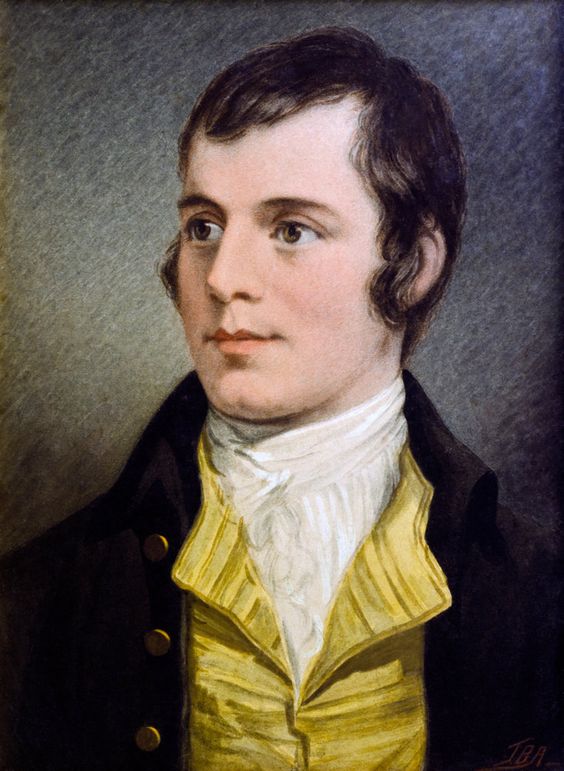ROBERT BURNS
January 25, 1759 - July 21, 1796
AULD LANG SYNE
Should old acquaintance be forgot
And never brought to mind?.........(NO! Never!)
Should old acquaintance be forgot,
And auld lang syne?1................(NO! Never!)
For auld lang syne, my dear,
For auld lang syne,
We'll take a cup of kindness yet,
For auld lang syne.
We two have run about the braes
And picked the daisies fine;
But we've wandered many a weary foot
Since auld lang syne.
We two have paddled in the burn
From morning sun til dine;
But seas between us broad have roared
Since auld lang syne.
And ye shall stand a round or two,
And surely I'll do mine;
And we'll take a cup of kindness yet
For auld lang syne.
And there's a hand, my trusty friend,
And give's a grip of thine;
And we'll take a right good hearty drink
For auld lang syne.
The resounding responses to the rhetorical questions in the second and fourth lines are, of course, my own additions. I hope they will help some of our younger bairn understand the poem before they get as old as I was when I finally understood it. This "translation" is taken from William Kean Seymour's Burns Into English. Renderings of Selected Dialect Poems of Robert Burns, (Philosophical Library - New York, 1954), p.151. The poem was first published posthumously in 1799 in George Thomson's Scottish Airs. Burns was born in Alloway, near Ayr, Scotland, January 25, 1759 and died in Dumfries, Scotland, July 21, 1796. (DFJ)
The following additional information on Auld Lang Syne may be more than anyone ever wanted to know about this poem but it was gathered to satisfy my curiosity about the song and I found it quite interesting. I hope some of you will also find it so. The notes below include the original text and some interesting remarks about the traditional manner of its singing. It is taken from The Complete Works of Robert Burns (Self-Interpreting). Illustrated with sixty etchings and wood cuts, maps and facsimiles. Volume III. Gebbie & Co., Publishers - Philadelphia. 1886. (DFJ)
AULD LANG SYNE.
(Johnson's Museum, 1796)
Should auld acquaintance be forgot,
And never brought to mind?
Should auld acquaintance be forgot,
And auld lang syne!
Chorus.--For auld lang syne, my dear,
For auld lang syne,
We'll take a cup o' kindness yet,
For auld lang syne.
And surely ye'll be your pint stowp! . . . . . flagon
And surely I'll be mine . . . . . (be = buy?? (DFJ))
And we'll take a cup o' kindness yet,
For auld lang syne. 1
For auld, &c.
We twa hae run about the braes,
And pou'd the gowans fine; . . . . . pulled the daisies
But we've wander'd mony a weary fitt . . . . . foot
Sin' auld lang syne.
For auld, &c.
We twa hae paidl'd in the burn, . . . . . waded
Frae morning sun till dine; . . . . . dinner-time (noon)
But seas between us braid hae roar'd
Sin auld lang syne.
For auld, &c.
And there's a hand, my trusty fiere! . . . . . comrad
And gie's a hand o' thine!
And we'll take a right gude-willie waught. . . mutually friendly draught
For auld lang syne.
For auld, &c.
["Of the two versions of this song, we adapt for our text that supplied to Johnson in preference to the copy made for George Thomson. The arrangement of the verses is more natural: it wants (lacks? (DFJ)) the redundant syllable (to be) in the fourth line of stanza first; and the spelling of the Scotch words is more correct. The poet transcribed the song for Mrs. Dunlop in his letter to her, dated 17th December 1788, and it is unfortunate that Dr. Currie did not print a verbatim copy of it, along with that letter, instead of simply referring his reader to the Thomson correspondence for it. Thomson's closing verse stands second in Johnson, where it seems in its proper place, as having manifest reference to the earlier stages of the interview between the long separated friends. Many of our readers must have observed, that when a social company unites in singing the song before dispersing, it is the custom for the singers to join hands in a circle at the words, "And there's a hand," &c. This ought to conclude the song with the chorus sung rapidly and emphatically thereafter. But how awkwardly, and out-of-place does the slow singing of Thomson's closing verse come in after that excitement! "And surely ye'll be your pint stowp," &c -- No, no! The play is over: no more pint stowps!
"The poet pretended, both to Mrs. Dunlop and George Thomson, that this song is the work of some heaven-inspired minstrel of the olden time, and to Thomson he went the length of saying, "it was never in print, nor even in manuscript till I took it down from an old man's singing."]
"(This statement has given rise in some quarters to doubts as to the authorship. They are plainly groundless. Is it credible that a song of such unrivalled merit could have remained unknown to all Scotland, save one "old man?" No one ever heard of it till Burns sent it to Mrs. Dunlop and Johnson. Chambers well remarks, that Burns was prone to indulge in little mystifications regarding his songs.--J. H.)
"1 This stanza is shifted to the end, in the Thomson copy. It must be mentioned that there exists a MS. of the song in the poet's holograph -- a kind of parody, intended apparently for "mighty Squireships of the quorum," -- in which the first verse runs thus:
Should auld acquaintance be forgot,
And never thought upon!
Let's hae a waught o' Malaga,
For auld lang syne.FEEDBACK . . . HOME
